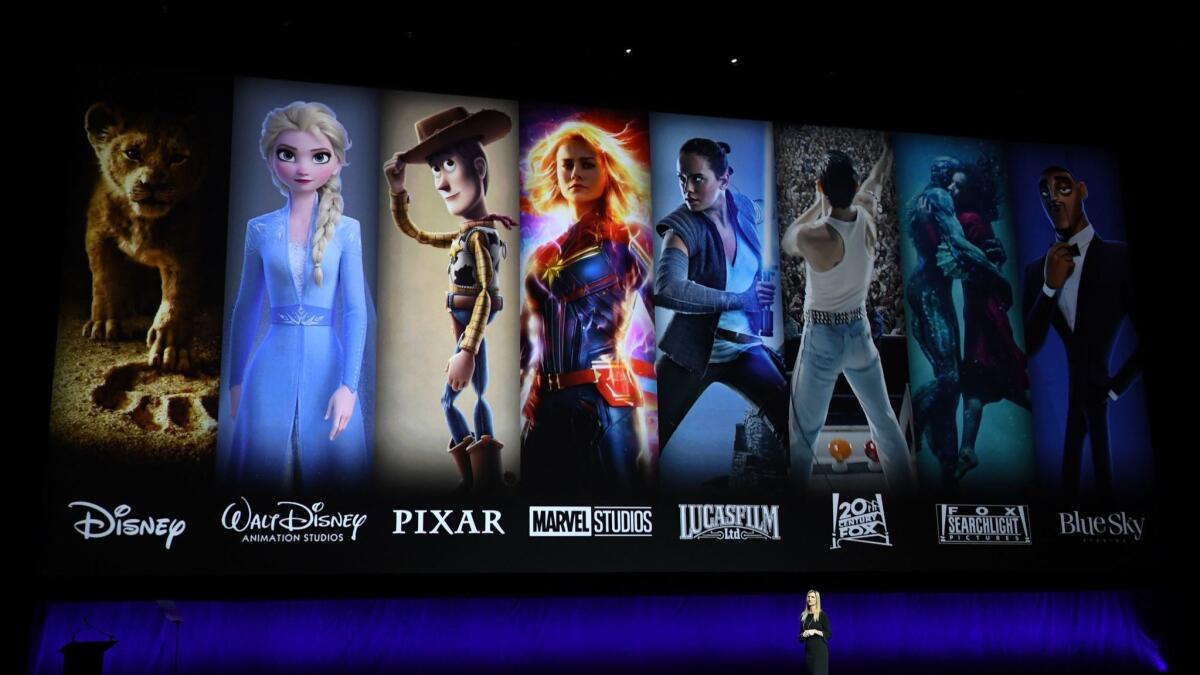Disney is finally ready to unveil its streaming service. What we know, and what we don’t

Forget the Avengers vs. Thanos. Get ready for Hollywood’s biggest rivalry: Disney vs. Netflix.
Investors on Thursday get their first look at Walt Disney Co.’s plan to go head to head with the Los Gatos, Calif., streaming service. The Burbank company is expected to finally give a preview of its long-awaited Disney+ subscription video service, a major gamble by Chairman and Chief Executive Bob Iger to solidify Disney’s position as a dominant force in the entertainment industry.
Iger has dropped hints about the company’s direct-to-consumer offering, signaling plans to make original “Star Wars,” Pixar and Marvel shows for the service.
But investors have been eagerly awaiting answers to key questions. Disney hasn’t announced when, exactly, the service will launch, saying only that it will be late this year. One person familiar with the company who was not authorized to comment said the service could launch in November.
Disney also hasn’t said what it will charge subscribers, how much content it will have, or how much it has budgeted for original shows and movies.
“The thing everyone is focused on is Disney+,” said Richard A. “Trip” Miller, managing partner of Gullane Capital, a Memphis, Tenn., firm that has been a small Disney investor since 2002. “We want to hear their case and their story for how they’ve got this right. I don’t know of a bigger story for them, at least for the next five years.”
Disney declined to comment for this story.
The stakes are high. Iger has called its streaming offerings, including the previously launched ESPN+, the “number one priority.” Disney last month closed its $71.3-billion acquisition of 21st Century Fox, including entertainment franchises such as “X-Men” and “Avatar,” to fill out its arsenal of intellectual property for the streaming push. Under the deal, Disney also acquired a majority stake in online video service Hulu.
Competition will be fierce. Netflix Inc. has a massive head start with nearly 150 million global subscribers. It is expected to spend $15 billion on content this year alone. Meanwhile, AT&T Inc.’s WarnerMedia and NBCUniversal parent Comcast Corp. are preparing their own direct-to-consumer strategies. Apple Inc. recently hosted an event touting original streaming content with luminaries including Steven Spielberg and Oprah Winfrey.
But Disney investors are hoping the rewards of the strategic pivot outweigh the risks. Disney shares closed virtually unchanged at $117.16 on Wednesday. They are up 15% from a year ago.
“Investor focus No. 1 is: Will the direct-to-consumer product work?” said Andrew Choi, senior research analyst at Parnassus Investments, a San Francisco firm that holds more than $800 million in Disney stock. “Is the money they put into it worth the returns they get, and will it hold up to Netflix and be complementary to Hulu?”
Disney paved the way for its foray into streaming when it paid $1.6 billion for a majority stake in streaming technology firm BamTech in 2017.
Although it remains to be seen how quickly Disney can become a player in the expanding streaming world, the company has some key advantages over rivals.

Disney holds a highly valuable portfolio of film properties, including Marvel, Pixar and Lucasfilm. With the addition of Fox titles, Disney is expected to control more than 40% of the domestic box office this year. This month’s “Avengers: Endgame,” from Marvel Studios, has already broken pre-sale records for theaters.
Importantly, the service’s family-friendly brands could make it an appealing draw for families with children and differentiate it from other services. According to census data, the U.S. has about 35 million families with children under 18, a prime demographic for the service.
“They have proven global hit capabilities, unparalleled content-creation skills and one of the most valuable libraries in the world,” said Michael Nathanson, a New York analyst with MoffettNathanson. “The question is, how much do they spend and how fast they can build it out?”
Details about Disney+ have so far been sketchy. Iger has said the service’s programming will be divided into five distinct categories: Disney, Marvel, Pixar, “Star Wars” and National Geographic, which was owned by Fox. The company’s edgier content from Fox will probably be funneled to Hulu.
Disney’s slate of original shows for the platform includes a “Star Wars” series called “The Mandalorian” from Jon Favreau, a show set before the events of “Rogue One: A Star Wars Story” and a Marvel series featuring Tom Hiddleston as Loki. Also in the works are a “High School Musical” series, a remake of “Lady and the Tramp” and a show called “Monsters at Work,” a spinoff from Pixar’s “Monsters, Inc.” The company on Wednesday disclosed a deal with production company Supper Club for a lineup of nonfiction series for the platform.
Pricing remains opaque. Many analysts speculate Disney+ will charge about $7 a month, which would be less than the $13 a month Netflix charges for its standard plan.
The costs of producing new content and building the app will be another key factor in investors’ thinking. Analyst Nathanson on Tuesday projected Disney’s direct-to-consumer segment would lose $3.8 billion in fiscal 2019 as it builds its service and incurs losses from Hulu. The company is also expected to lose out on licensing revenue when it pulls its content from Netflix. Disney, in February, said it expects to forgo about $150 million in licensing income this fiscal year as it yanks its movies from Netflix.
“How much are they going to sacrifice near term profitability to grow it over the long run?” said Kavi Shelar, a research analyst for Diamond Hill Capital Management, a Columbus, Ohio, investment firm that owns Disney stock. “It’s all about scaling the business over time.”
Iger, speaking to analysts, compared the build-out of its streaming products to Disney’s spending on theme park expansions.
“What we’re basically trying to do here is invest in our future,” Iger said. “And the investments that we’re making in both the technology side and in creating incremental content are all designed so that long-term this business will become an important part of Disney’s bottom line and long-term strategy.”
Some analysts are tempering expectations for what Disney will reveal about Disney+ this week. Bernstein & Co. media analyst Todd Juenger does not expect Disney to reveal pricing or provide projections for subscriber growth. Rather, he said in a Tuesday research report, the company will probably give a preview of the product, including some trailers or footage or snippets of exclusive content, plus mock-ups of the user interface.
Disney is “not going to make promises that they then have to keep,” Juenger wrote.
Executive succession plans will also be on investors’ minds.
Kevin Mayer, the executive in charge of Disney’s streaming initiatives, is considered one of the top candidates to replace Iger once he retires. Iger, who has postponed his departure multiple times, is now expected to leave when his current contract expires in 2021. Former Fox leader Peter Rice, who is chairman of Walt Disney Television and co-chair of Disney Media Networks, is another strong potential candidate.
The possible candidacy of Mayer, who is chairman of direct-to-consumer and international at Disney, will depend largely on the success of Disney+.
Mayer “will definitely be a thought on investors’ minds,” said Choi, of Parnassus. “He was picked as the guy to lead it. If it works, it will be a major accomplishment qualifying him for the job.”
More to Read
Inside the business of entertainment
The Wide Shot brings you news, analysis and insights on everything from streaming wars to production — and what it all means for the future.
You may occasionally receive promotional content from the Los Angeles Times.











